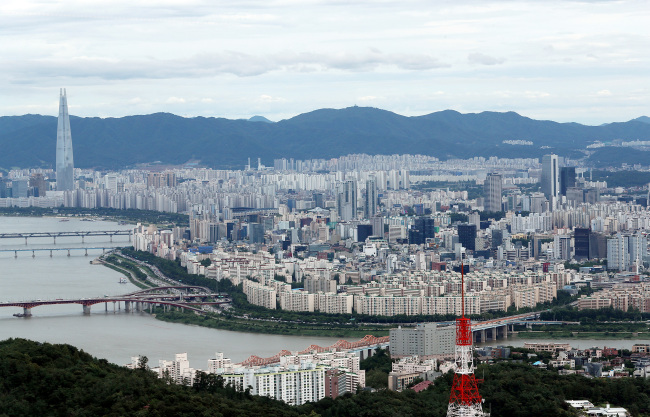The Moon Jae-in administration’s expansionary fiscal policy will probably prove unsustainable in a couple of years due to a possible decline in tax revenue that might stem partly from reduced corporate profits, economists say.
On the back of a continuous rise in tax revenue, President Moon’s government has been increasing fiscal spending at a steep pace to expand welfare and employment programs. It is also under growing criticism for squandering taxpayer money to cope with the unintended effects of its income-led growth policy, which has resulted in reducing jobs and earnings particularly for low-income households.
According to figures released by the National Tax Service last week, the country’s tax revenue amounted to 255.6 trillion won ($226.6 billion) last year, up 9.5 percent from a year earlier.
Taxes collected from companies increased 13.5 percent on-year to 59.2 trillion won, accounting for nearly a quarter of the total revenue. About 40 percent of corporate taxes last year was shouldered by manufacturing firms.
A fiscal report published earlier this month by the Ministry of Strategy and Finance showed that Korea’s tax revenue amounted to 140.7 trillion won in the first five months of this year, up 16.9 trillion won from the same period of last year.
 |
(Yonhap) |
The revenue increase has served to embolden the Moon administration to expand fiscal spending.
It drew up an 11 trillion-won supplementary budget shortly after Moon took office last year and another one worth 3.8 trillion won this year to help create more jobs and increase welfare benefits. The 2018 national budget set at 428.8 trillion won marked a 7.1 percent rise from 2017.
Despite such increased fiscal expenditures, unemployment has worsened and income inequality has widened over the past year, prompting calls for the Moon administration to reconsider its income-pulled growth drive propelled by a set of pro-labor measures including steep minimum wage hikes.
It sent clear signals of staying on course last week by announcing an additional package of programs designed to strengthen financial support for low-wage earners, jobless youths and the elderly. Experts estimate it will cost about 4 trillion won in taxpayer money to implement such programs.
Warnings have been raised that a continuous rise in tax revenue is far from guaranteed as the weakening competitiveness of the country’s key industries amid deteriorating external conditions is set to reduce corporate profits and levies collected from local companies.
“In fact, the revenue increase in recent years is attributable largely to the previous administration’s efforts to reinvigorate corporate activity through tax breaks and other measures,” said Yoon Chang-hyun, a professor of business administration at the University of Seoul.
He stressed the need for the government to save taxpayer money in preparation for “a rainy day,” noting the economy is showing signs of being dragged into recession.
According to FnGuide, a financial information provider, the estimate of the combined operating profits of local listed companies for the second quarter of 2018 slid from 50.27 trillion won at the end of last year to 45.13 trillion won last week.
Apart from chipmakers Samsung Electronics and SK hynix, which have benefited from booming global demand, the operating profits of the 77 largest manufacturing firms during the April-June period this year were estimated to decline by 534.7 billion won from a year earlier.
The on-and-off sign of a downturn in exports has deepened concerns that corporate profits will fall further, putting the brakes on the upward trend in tax revenue.
Korea’s outbound shipments dropped 1.5 percent on-year in April, snapping a 17-month streak of increase, according to data from the Ministry of Trade, Industry and Energy.
They rebounded in May but decreased again the following month. In the first 10 days of July, the country’s exports fell 1.9 percent, raising worries about a possible contraction for two consecutive months.
In a forecast that could add to concerns for the export-reliant Korean economy, the International Monetary Fund recently revised down its estimate for growth in global trade over the years through 2020 from 5.1 percent to 4.8 percent.
“The revenue increase is due mainly to the strengthened scheme of tax collection and should not be regarded as reflecting an improving economy,” said Shin Se-don, an economics professor at Sookmyung Women’s University. He noted it was necessary to make preparations in advance for the time that tax revenue would fall short.
A Finance Ministry official, who requested anonymity, said there would be no problem with tax revenue owing to a boom in the semiconductor sector this year and next, but conceded no credible forecast could be made beyond then.
It seems unlikely that the administration and ruling party would pay heed to concerns over the sustainability of expansionary fiscal policy.
Rep. Hong Young-pyo, floor leader of the ruling Democratic Party of Korea, recently said the Finance Ministry was getting closer to the party’s demand for a 10 percent spike in fiscal spending next year. This means the 2019 budget could exceed 470 trillion won.
Government budget planners might seek to mitigate the ruling party’s enthusiasm for fiscal expansion to some extent, but they appear ready to increase next year’s budget at a steeper pace than this year’s 7.1 percent rise. The move would nullify a fiscal management plan drawn up by them last year, which envisions the 2019 budget will expand 5.7 percent from 2018 to 453.3 trillion won.
By Kim Kyung-ho (
khkim@heraldcorp.com)








![[Today’s K-pop] Blackpink’s Jennie, Lisa invited to Coachella as solo acts](http://res.heraldm.com/phpwas/restmb_idxmake.php?idx=644&simg=/content/image/2024/11/21/20241121050099_0.jpg)